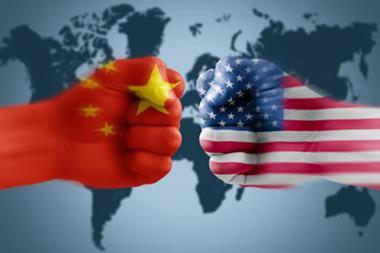Operating successfully will depend on the ability of companies to proactively manage political risks. A new survey shows how the landscape is shifting, and how risk managers can respond.
Nine out of ten companies have suffered a political risk loss in the past year, transforming Political Risk from a low-frequency, high-severity peril into “everyone’s risk’.
The 6th annual political risk survey produced by Willis Towers Watson (WTW), found that an unprecedented 92% of all responding companies experienced a political risk loss in 2022, up from 35% in 2020.

Other findings include:
- 86% of Western European respondents reported a net negative financial impact from the conflict in Ukraine
- 33% of North American firms suffered a net negative financial impact
- 48% of respondents reported a direct political risk loss in one or more BRIC countries
- 100% of responding companies enhanced their political risk management capabilities since February 2022
- 68% now purchase political risk insurance, compared to 25% in 2019
- Nearly 50% predict deglobalization will “greatly strengthen”
- 42% say decoupling from China will “greatly strengthen”
The ongoing conflict in Ukraine and resultant humanitarian consequences have had a business impact that one European organisation in the survey described as “devastating”.
A US technology-company respondent said: “We have decided to end all our operations in Russia and Belarus. We suffered a loss of almost $1 billion.”
Whatever the financial impact, the shock of war on the European continent has triggered a “paradigm shift,” one respondent said.
According to an executive in the automotive sector: “Business and politics have lived in two different realities. The events of the past year have now aligned realities.”
Looking to the year ahead, Ukraine heads the list of interview panel members’ top risks for 2023, followed closely by decoupling from China and crisis and new regulations in the EU.
Top Risks 2023, according to WTW survey respondent mentions
- Ukraine
- Decoupling from China
- European crisis/European rules
- Economic nationalism
- Serious ESG
- US uncertainty
- Rich-world social instability
- Contested geopolitical alignments
- Taiwan
- Bigger government
How organisations are affected
Panellists were worried about the escalation of the conflict in Ukraine, but more worried about complications like sanctions and inflation.
Sam Wilkin, Director of Political Risk Analytics at WTW explained: “They’re worried that they could be arrested for facilitating avoidance of sanctions, for example, or that they could be pressured to renegotiate energy contracts next autumn.
”Every day is China strategy day”
”At the same time, they have more profound concerns about how globalised business models can be made to work in a politically divided world.”
For instance, many panellists struggled to imagine how the US-China economic relationship could be unwound without overwhelming damage to the world economy.
Many companies are becoming nervous about continuing business there but are unsure about how to disconnect from such a major market. “Every day is China strategy day,” one European automotive sector panellist said.
What does it mean for risk managers?
Until recently it was possible for most companies to manage political risk almost without effort. That was true for two reasons.
First, political risk losses tended to occur in small markets where the risks were blindingly obvious (e.g., Venezuela, Iran, Zimbabwe). Second, political risk losses were in many cases recoverable with sufficient effort, for instance via litigation or arbitration using investment treaties.
These two facts tended to keep losses small.
Now, political threats are present in major markets that were previously the darlings of globalisation and perceived as low risk, where companies really didn’t expect to take political losses (Russia, India, China).
”Many companies that thought they were managing political risk are realising that those risks had been managing themselves.”
Moreover, the types of loss events that are taking place (e.g., sanctions following the escalation of conflict in Ukraine) are losses that no lawyer can sort out.
Wilkin said: ”I think these shifts have delivered a huge shock and you can see that shock reflected in the survey results (e.g., the pessimism about the direction of global trends and the fact that 100% of companies had added to political risk management capabilities).
”Many companies that thought they were managing political risk are realising that those risks had been managing themselves, and in the wake of that realisation, they are struggling somewhat.
”Many risk managers who didn’t need to think about political risk exposure – and had left such issues to external affairs or country managers to address – are suddenly being asked to manage it.”
How can risk managers prepare for ongoing political risk?
Wilkins says there he believes there has been some overreaction, and that organisations should still be thinking internationally.
However, doing so successfully will depend on the ability of companies to proactively manage political risks.
”Techniques we profile in the survey, like scenario planning and putting political risk explicitly in ERM, will help.”
He concludes: ”Companies we interviewed said they were reluctant to invest in Germany or Poland, presumably as a result of its proximity to Ukraine. That doesn’t seem rational to me. I think that there are still lots of gains to be had from globalisation, both for companies and societies.
”Some of the techniques we profile in the survey, like scenario planning and putting political risk explicitly in ERM, I think will help. Insurance will also play a role.”




















No comments yet